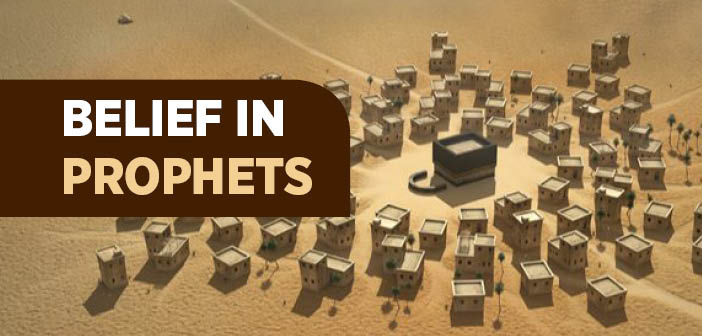What does islam believe about prophets? What is the function of the prophets?
The word rasūl is Arabic and literally means “the bearer of news and a messenger”. As a term, “A messenger, whom Allah selects from among His servants and commissions to convey His orders and prohibitions to people through revelation, is called a rasūl. In Arabic, the word “mursal” is also used to refer to the same meaning. Their plural forms are “rusul” and “mursalūn” respectively. Rasūl, as a term, specifically refers to a messenger who was sent with a new book and a new law. Moses, Jesus, and Muhammad (alayhum al-salam) are such messengers. Nabī is a prophet who informs people of Allah’s orders and prohibitions but is not sent with a new book and a new Shari’ah, yet he is tasked with conveying the book and law of a previous prophet to his nation. The plural of nabī is “anbiyā”. In general, the words risālah and nubuwwah are the infinitive forms meaning prophethood. Although every rasūl is at the same time a nabī, every nabī is not a rasūl. Therefore, Moses, David, Isa, and Muhammad (alayhum al-salam) are both rasūl and nabī.
Belief in the prophets is one of the six pillars of faith and includes believing in all the prophets, whose names are both revealed and not revealed in the Qur’an or authentic hadiths, and the accuracy of their news as brought from Allah. In the Qur’an, it is emphasized that it is a requirement for Muslims to believe in all the prophets without making any distinction between them. In one Qur’anic verse, it is stated, “The Messenger believes in what has been revealed to him from his Lord, as do the men of faith. Each one (of them) believes in Allah, His angels, His books, and His messengers. “We make no distinction (they say) between one and another of His messengers.””[1] Therefore, believing in some of the prophets and not believing in others is considered heresy. This fact is clearly observed in the following Qur’anic verses: “Those who deny Allah and His messengers, and (those who) wish to separate Allah from His messengers, saying: “We believe in some but reject others” And (those who) wish to take a course midway, they are in truth (equally) unbelievers; and we have prepared for unbelievers a humiliating punishment.”[2]
Allah Almighty has sent various prophets to human communities throughout human history. It is stated in several Qur’anic verses that there is no community or nation that did not receive a prophet, “For We assuredly sent amongst every People a messenger, (with the Command), ‘Serve Allah, and eschew Evil’”[3], “There never was people without a warner having lived among them (in the past).”[4], “By Allah, We (also) sent (Our messengers) to Peoples before you…”[5], and “Of some messengers, We have already told you the story; of others, We have not…”[6]
Prophecy is not a rank that can be attained through worship, prayer, or study. It is given only by the choice and assignment of Allah Almighty. The following is stated in the Qur’an, “Such is the Bounty of Allah, which He bestows on whom He will…”[7]
Communication between Almighty Allah and His Prophet is through waḥy. Waḥy literally means “secret speech, command, sign, and inspiration”. As a term, it is Allah’s revelation or sending of whatever He wishes to His prophet in a special way that is under His protection and control. In one Qur’anic verse, the following is stated regarding revelation, “It is not fitting for a man that Allah should speak to him except by inspiration, or from behind a veil, or by the sending of a messenger to reveal, with Allah’s permission, what Allah wills: for He is Most High, Most Wise.”[8] The revelation came to the Prophet in the following ways: a) True dreams, b) Gabriel (as) transmitting the revelation to the Prophet’s heart while he was awake[9], c) Gabriel transforming into a human form and bringing the revelation. d) Revelation coming with a sound similar to the sound of a bell, without Gabriel having been seen[10], e) Revelation brought by Gabriel in his original form[11], and f) the Prophet receives the revelation directly from Allah, which takes place in the form of speaking directly with God. Such was the revelation that was received during the event of Miraj (Ascension).
Islam, as in all matters, pursues the middle path in the issue of prophethood assigning the prophets the task of an envoy only between Allah and the people. A prophet does not have the power to benefit or harm anyone except with Allah’s permission, and he does not know the ghayb except in whatever Allah has revealed to him.[12]
Finally, Islam proclaims clearly that prophethood ended with Muhammad. The message of Almighty Allah to the world of humanity came to an end with the Qur’an. The following is stated in the Qur’anic verse: “Muhammad is not the father of any of your men, but (he is) the Messenger of Allah, and the Seal of the Prophets: and Allah has full knowledge of all things.”[13] To suggest that a new prophet or book will come after him means denying the fact that Muhammad is the last prophet of Allah.
[1] Al-Baqara, 2: 285.[2] Al-Nisā, 4: 150-151.[3] Al-Naḥl, 16: 36.[4] Fāṭir, 35: 24.[5] Al-Naḥl, 16: 63.[6] Al-Nisā, 4: 164.[7] Al-Jumu’a, 62: 4.[8] Al-Shūrā, 42: 51.[9] Al-Shuʿarā, 26: 193-195.[10] Al-Bukhari, Bad’ al-waḥy, 2.[11] Al-Najm, 53: 13-14.[12] See al-Mā’ida, 5: 72, 73, 75; al-Aʿrāf, 7: 188; al-Tawba, 9: 30.[13] Al-Aḥzāb, 33: 40.
Source: Basic Islamic Principles (ʿilmi ḥāl) According to the Four Sunni Schools With Evidence From The Sources of Islamic Law, Prof. Hamdi Döndüren, Erkam Publications




